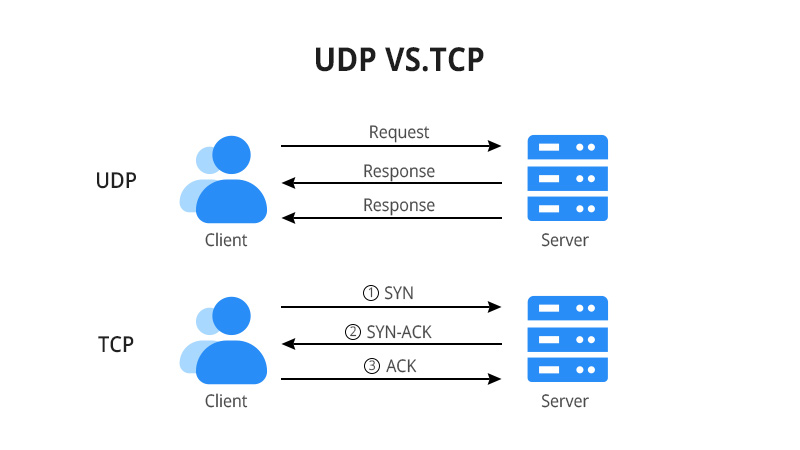UDP
What is UDP (User Datagram Protocol)?
UDP refers to the User Datagram Protocol, a communication protocol for time-sensitive applications such as gaming, video streaming, and Domain Name System (DNS) lookups. Because UDP does not require a stable connection to the target device before transmission, it can significantly increase communication speed. UDP speeds up data transfer by eliminating the time-consuming connection establishment process of traditional protocols.
However, UDP's speed advantage comes with some potential risks. UDP can cause packet loss as data is transmitted from the source to the destination. In addition, because of its connectionless nature, UDP is an easy target for hackers to launch distributed denial-of-service (DDoS) attacks.
In general, protocols such as the Transmission Control Protocol (TCP) require the receiver to not only receive the data but also confirm that it is ready to receive it before the data transmission begins. UDP, however, does not wait for this acknowledgment before beginning transmission, which can cause data transmission problems and create opportunities for DDoS attackers.
How Does UDP Work?
Compared to other network protocols, UDP is much simpler. It simply finds the destination computer and sends it a packet of data (also known as a "datagram.") UDP does not guarantee that the packets will arrive in order, nor does it confirm that they have reached their destination.
Although UDP uses checksums to ensure data integrity and port numbers to distinguish data usage at the source and destination, this simplicity poses some problems due to the lack of a forced handshake mechanism. Programs that use UDP are subject to the instability of the underlying network.
As a result, data may be successfully transmitted or lost. In addition, because there is no control over the order in which packets arrive, data may appear jagged, out of order, or blank when displayed at the final destination.
However, these problems are usually minor if error detection and correction are not required. This is one of the reasons UDP is often used in video applications. Even with the occasional data loss or error, promptly getting the video signal to its destination is still a top priority.
The Different Between UDP vs. TCP
When data is transmitted from one place to another, a header tells the device what to do with the data. UDP's header is straightforward, a fixed 8 bytes, while TCP's header is much more complex, ranging from 20 to 60 bytes in length. UDP's header contains a 16-bit source port number, 16-bit destination port number, 16-bit length, and 16-bit checksum, which guide the datagram to its destination. header includes a 16-bit source port number, a 16-bit destination port number, a 16-bit length, and a 16-bit checksum, which guide the datagram to its destination. No authentication of the connection between the source and destination ports is required when sending data.
In contrast, TCP requires a handshake before data is sent, a process that makes TCP more reliable than UDP. In TCP communication, data can only be transmitted once a formal connection has been established between the destination and the source. On the other hand, since no link needs to be established with UDP, data can be sent out immediately.
Another difference is that TCP confirms the packets' order before transmission and ensures that the packets arrive on time. If a packet fails to arrive, TCP automatically requests it be resent. On the other hand, UDP does not perform any acknowledgment, checking, or retransmission.
If an application chooses to use UDP, the user accepts the risk that errors may occur, data may not arrive, or data may be resent. The payoff for this choice is faster transmission speeds. UDP is not necessarily to blame for data loss. Its header information is sufficient to allow data to arrive at the specified location, and the order in which the datagrams are sent can remain essentially correct.
However, most network routers cannot confirm the arrival of packets or sequence them, which can result in lost or duplicated packets. TCP compensates for this by ensuring that the data reaches its destination in the correct order.

The Application of UDP
UDP is typically used in communication scenarios where speed is essential, but a small amount of data loss is tolerated. Real-time streaming media transmissions like voice and video are typical applications because they require timeliness rather than 100 percent accuracy. For example, many Voice over Internet Protocol (VoIP) services use UDP because it reduces latency and makes calls smoother, even if some sound quality is sometimes sacrificed.
Similarly, UDP is widely used in online gaming. For gamers, a fast response is more critical than occasionally losing some data. In addition, DNS servers also rely on UDP for the speed and efficiency of their queries since such services require fast responses to operate effectively.
How is UDP Used in DDoS Attacks?
While UDP (User Datagram Protocol) excels when fast, real-time data transfer is required, it makes the receiver more vulnerable to DDoS attacks.
In a DDoS attack, the target website is flooded with packets. Whenever a problem occurs, the target server must send an ICMP packet in response. Since the server cannot cope with such many requests, it will eventually be overwhelmed, like a clogged sewer. As a result, legitimate requests can't get through, and genuine users and customers can't access the site properly.
UDP's connectionless nature makes it particularly vulnerable to DDoS attacks. Because no handshake connection needs to be established between the source and the target, an attacker can send many packets to the target server without hindrance.
However, organizations can mitigate this attack risk by limiting the response rate of ICMP packets. Utilizing the data center network for UDP traffic can prevent spoofed requests from overwhelming individual servers.












